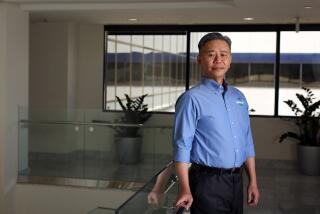POWER ON THE PACIFIC RIM : Profiles : 10 Pacific Rim Giants Tread Own Paths to Influence : Wang Yung-ching: Profit vs. the Environment
- Share via
TAIPEI, TAIWAN — One is the illegitimate son of a wealthy industrialist. The foundation of another’s fortune was a long-ago U.S.-backed loan.
A third is a notorious high-stakes gambler liable to risk millions of dollars in a day at the racetrack, while yet another furnishes his house in plastic.
A capitalist who backed a revolution is on the list, as is a refugee from communism who is now devoting much of his energy to courting his giant Communist neighbors.
They’re all among the wealthiest and most influential businessmen in Asia--10 titans of the Pacific Rim. Not surprisingly, several of them have extremely close ties to the political leaders of the region. Five are ethnic Chinese. Six were born to wealth, but four others started from little or nothing.
Meet a diverse group of business leaders likely to continue having a strong influence on the shape of the region:
Formosa Plastics Group Chairman Wang Yung-ching, often described as the richest man in Taiwan, built his multibillion-dollar fortune on hard work, corporate efficiency, cheap labor and, critics say, disregard for the environment.
In the process, he contributed mightily to Taiwan’sprosperity. Petrochemicals are a key industry in Taiwan, and Wang’s operations reportedly account for close to 5% of the country’s gross national product.
So Wang, 74, sent shock waves through Taiwan’s power structure last year when it was reported that he planned to invest $7 billion in a petrochemical complex in China’s Fujian province.
The story made sense. Rising land costs and protests by environmentalists and local villagers were blocking Wang’s attempts to build a new $2.2-billion complex in Taiwan. Meanwhile, Beijing welcomed the Fujian province proposal with open arms.
The Nationalist authorities in Taipei responded with alarm. While they have not seriously objected to smaller firms doing business in China through third-country subsidiaries, the specter of Wang moving such a major project to the mainland raised fears that an uncontrollable tide of key businesses might follow suit.
Wang reached such influential status from humble beginnings. He was the son of a poor tea merchant, and it has been reported that he didn’t own a pair of shoes until he was 13. He got started in business with a rice-husking mill, back when Japan still occupied Taiwan. The mill was destroyed by U.S. bombs in 1944.
A decade later, after a stint in the lumber business, Wang started Formosa Plastics Corp. with a U.S.-backed loan.
That empire includes a number of chemical-processing companies in the United States, where Wang is a major supplier of plastic pipe. His U.S. offices also are convenient for planning China investment, which under Taiwan law can be done only through overseas subsidiaries.
Wang keeps a penthouse home at his Taipei corporate headquarters, complete with rooftop pool and running track. His taste for furnishings runs to plastic--for everything from dishes to wall paneling.
Whether Wang will take a piece of his plastics empire to China remains to be seen. Last year, he announced plans to re-emphasize operations in Taiwan.
“Taiwan’s petrochemical industry should search for a second spring,” Wang wrote in an open letter published in Taiwan newspapers. “It is extremely important that everyone should strive to stop the movement offshore.”
Analysts noted, however, that nowhere in his statement did Wang say he was abandoning the Fujian proposal. Some say it looks like Wang is simply trying to get the best possible deals on both sides of the Taiwan Strait. That would not be out of character.
More to Read
Inside the business of entertainment
The Wide Shot brings you news, analysis and insights on everything from streaming wars to production — and what it all means for the future.
You may occasionally receive promotional content from the Los Angeles Times.










